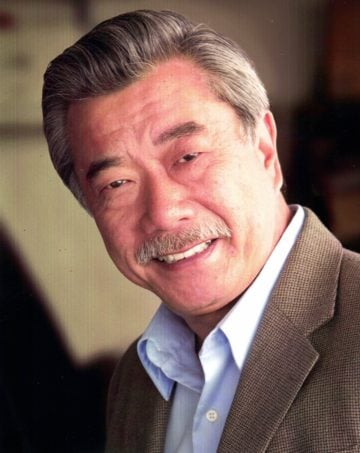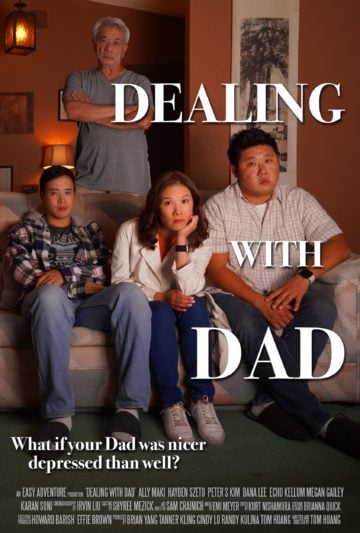[ad_1]
Dana Lee is one of the country’s most overlooked Asian American actors. He has been in over 100 films over the course of his 50-year career in Hollywood, but his childhood began in segregation-era Houston.
Lee stars in a new feature film directed by Tom Huang called Dealing With Dad, which is screening at the 45th Asian Film Festival of Dallas on July 23 at the Angelika Film Center.
Lee plays Jialuo Chang, who is depressed after recently losing his job. He stays in bed all day watching The View and refuses to leave the house. The film follows his daughter Margaret (played by Ally Maki) as she travels back to her hometown, with her two brothers Larry (Hayden Szeto) and Roy (Peter S. Kim), to support her family.
Things take a strange turn when the two brothers want to keep their father depressed because he’s easier to deal with (as he isn’t angry or barking orders at them). Margaret is the only one who puts her father’s well-being first, helping him get better.
It’s still uncommon for many families to openly discuss mental health. As the director said: “I’m looking to start a discussion about depression, a topic that many families, Asian American or otherwise, tend to avoid.”
“My own experience is what inspired me,” Huang said, explaining that Lee’s character is based on Huang’s own father, who fell into a depression for eight years after losing his job at General Electric in Fremont, California.
“I remember coming home from college to find my typically active, overbearing father spending his days sitting in his recliner, listless and watching daytime talk shows,” he said. “I asked my mom what was wrong with him, and she said ‘Oh, he’s just a little sad, he just needs to walk around more, he’ll be okay.’”

That experience helping his father recover was the basis of the film. “A lot of immigrant communities think it’s a weakness, rather than something that needs to be treated,” said Huang. “After my dad got better, I felt like it was such a profound experience for me, I didn’t want other people to have to go through it.”
“It’s something that needs to be treated and diagnosed. People don’t have to feel helpless; they can do something about it,” he added.
The film might be a drama, but it’s also exquisitely funny. Since Huang’s background is in TV writing, there’s a ton of hilarious jokes, mishaps, and awkward situations. Most of the actors, including Lee, are experienced comedians with the timing to deliver on Huang’s script.
Though he might not be a household name like Bruce Lee or Jackie Chan, Lee has been acting for over 50 years. Some of his notable appearances include the 1970s TV series Kung Fu, and Sylvester Stallone’s Rambo: First Blood Part II, where he plays the role of Vietnamese soldier Trong Kinh, who leads a group of villainous pirates.
He can also be seen in vintage episodes of the soap opera Dynasty, as Ken Jeong’s father in the TV show Dr. Ken, which ran from 2015 to 2017, and in his recurring role on Larry David’s Curb Your Enthusiasm as Mr. Takahashi. He also appeared in Pineapple Express and as Doc in Birds of Prey.
Lee was born in a small village outside of Guangzhou, China, in the 1940s (he won’t specify his age, he just says “I’m up there in my late 70s”). When Lee was seven, his family immigrated to the U.S. and settled in Houston. They were one of the few Chinese families living in segregated Houston, growing up in Denver Harbor, while his father owned a grocery store in the Fifth Ward. To overcome his shyness, Lee studied acting at Stephen F. Austin High School in Sugar Hill (a suburb of Houston). He loved acting so much that he moved to Los Angeles in 1964 to pursue it as a career.
We asked him to look back at his childhood, to reflect on his new role and the legacy of Asian American actors, the art of playing dads, and even about working with Stallone.
What did you think of your role when you first read the script for Dealing With Dad?
Dana Lee: I know a lot of people, my parents included, who were kind of like that. I would love to be able to play that character and maybe give him reasons for why he’s like that. He is a product of his environment and his cultural upbringing, meaning he was taught as a young man to have a family and provide for them, that’s how he shows love to his family, by working hard and giving them as much as he can.
Is mental health overlooked in the Asian American Pacific Islander community?
Growing up, it was never addressed, nobody ever talked about it. We put the blame on them, asking “What’s wrong with you, why are you like that? Can’t you be normal?”
Is it different now, talking about mental health issues?
It’s changing; it depends on where you live. I am from Houston, Texas. Growing up with that Texas culture and the Chinese culture combined, [we] really truly didn’t deal with mental illness. In Dealing with Dad, growing up in Texas and being Chinese, mental illness was not something you thought about, much less talked about. It never occurred to anyone that it could be a problem.
“As Chinese Americans, we could live in the white section of [Houston], but we couldn’t work there.”
What was it like growing up in Houston?
I left in 1964, right out of high school. From my formative years there, Houston was segregated. There weren’t a lot of Asian Americans in Houston, never mind Chinese Americans. It was also a time when the Second World War wasn’t a distant past. The Korean War had recently ended [in 1953] and there was the rumor of the Vietnam War happening. All this talk of Asians being the enemy. People called me derogatory terms all the time. As Chinese Americans, we could live in the white section of town, but we couldn’t work there. My dad had a store in the Black section of town, Denver Harbor. It was a poor section of town. We could drink at the white fountains in town. It was ridiculous.
Have you been back?
I haven’t been back in 32 years. It has changed a lot. It’s the most diverse city in America. I think it means people who have different nationalities are represented in Houston. Still, New York and Los Angeles are much more diverse, but it’s an oil town. You get a lot of people from the Middle East, South America, and Africa coming to do business. There’s a lot of representation.
You’ve done a lot of dad roles over the years, including playing Ken Jeong’s dad in Dr. Ken. What goes into becoming a father role on screen?

I like to create a well-rounded character. Most of the dads I play have one dominant characteristic, usually a tough guy. Here and there, I like to show the opposite side of the character. On Dr. Ken, the father character allowed me to do that. There were episodes where I was able to show a variety of emotions, it’s one of the best roles I’ve ever had in my life.
You’ve done a lot of comedic roles over the years, who are your comedy heroes?
Robin Williams. Bill Murray. Richard Pryor. Lenny Bruce, I would love to be able to do what he was going for, biting comedy.
Your role as the father in Dealing With Dad, he doesn’t talk much, but he has this all-knowing wisdom. Where does that come from?
The wisdom has to be there because of the age of the character. If you don’t learn by your late 60s, early 70s, something is wrong with you. That comes with age and living. I’m in my late 70s. It isn’t only that. I like to give props to all the Asian American actors who came before me, they paved the way for me. Actors like Keye Luke, Victor Sen Yung, Philip Ahn, and James Shigeta, who I worked with. [I] owe part of my career to him.
What is one major lesson you’ve learned about acting?
I have never forgotten what my high school acting coach, Mr. Jerry Long, told me: “A good actor can transcend race, ethnicity, and color.”
What was it like working with Sylvester Stallone in the 1985 film, Rambo: First Blood Part II?
Well, it was my first major movie. I had only done TV shows and one movie before then. I had a major role in Rambo. I was really scared when I met Stallone. There was a scene where I had to slap him. Right before we started shooting the take, Stallone came over to me and looked down at my knuckles, because I was wearing rings all over my fingers. He said “You better not actually hit me, otherwise you’re going to have a story here.” I thought, “oh no!” But the way it was shot, I didn’t slap him. It was my first major role, I was nervous.
What have you learned over the years from directors?
What I’ve learned over the years from directors is that you can’t tell how the film will turn out while shooting. Just trust the director. My job is only to fulfill their vision.
What advice do you have for young actors today?
My advice for young actors is that acting is communication, communication of thoughts, ideas, and feelings. Don’t forget that it’s not about you, it’s about the project. And don’t think you should be hired because you are good. They’re not looking for the best actor, they’re looking for the right actor. An Actor Prepares by Constantin Stanislavski is a great reference book.
[ad_2]
Source link

